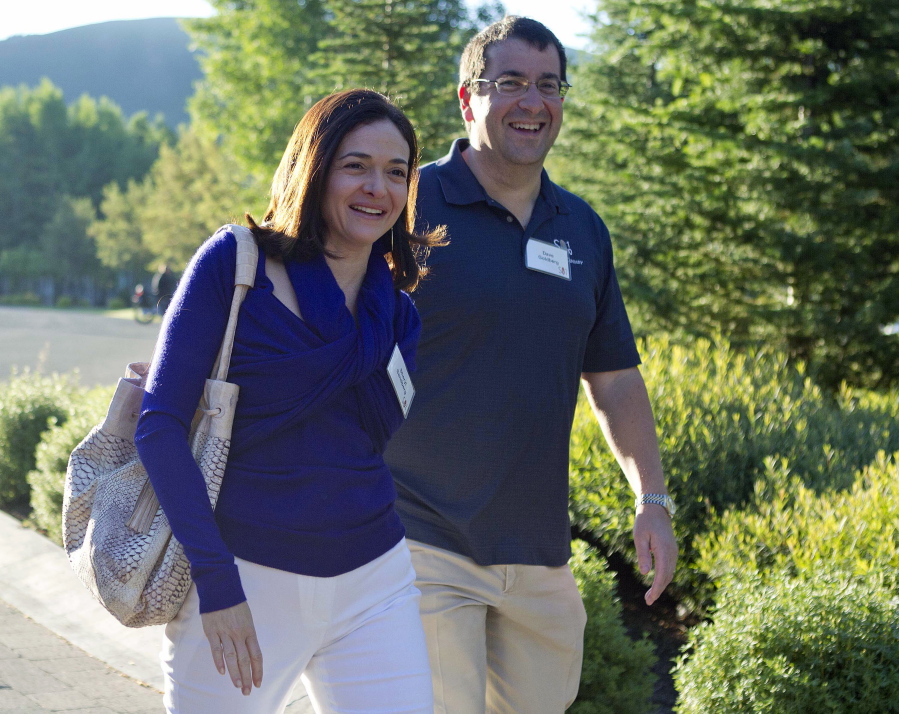NEW YORK — Though perhaps best known as Facebook’s No. 2 executive, Sheryl Sandberg is also a mentor, a mother, a billionaire and an author. When her husband Dave Goldberg died suddenly in 2015 while they were vacationing in Mexico, she added “widow” to the list.
“The grief felt like a void, like it was sucking me in and pushing on me, pulling me in and I couldn’t even see or breathe,” she said in an interview with The Associated Press. “People who have been through things like this told me it gets better. And I really didn’t believe them … I want other people going through things to believe it does get better.”
Her new book — “Option B: Facing Adversity, Building Resilience and Finding Joy,” written with psychologist Adam Grant — chronicles the devastating loss, her grief and how she emerged from it with a new perspective on life. A humbled follow-up to her first book, “Lean In,” it’s also a how-to, drawing from studies and the experiences of others to describe techniques for building strength and resilience and ways to support those going through hard times.
It quickly became the No. 1 best seller on Amazon on Monday, the day it was published.
Sandberg also uses the new book to address what she now sees as shortcomings in the career advice she offered women in “Lean In.” Surveying the world as a wealthy corporate executive rendered her oblivious to the circumstances faced by less fortunate women, she acknowledged. Not everyone can lean in; not everyone wants to.
“I didn’t get it,” she wrote. “I didn’t get how hard it is to succeed at work when you are overwhelmed at home.”
The most affecting parts of the book recount not just Sandberg’s grief, but that of her children. When she had to tell them that their father died. When, arriving at the cemetery for his funeral, they “got out of the car and fell to the ground, unable to take another step. I lay on the grass, holding them as they wailed,” unable to protect them from their sorrow.
It did get better, though slowly. Sandberg returned to work at Facebook in a haze, unable to summon her previous self-confidence.
“I couldn’t understand when friends didn’t ask me how I was. I felt invisible, as if I was standing in front of them but they couldn’t see me,” she wrote, adding later, that by staying silent in such situations “we often isolate friends, family and co-workers.”
At Facebook, Sandberg has long been an advocate of “bringing your whole self to work,” meaning a willingness to share your personal life with co-workers. But this can get tricky when it comes to facing trauma. Sandberg found it difficult, and even considered carrying around a stuffed pachyderm to encourage co-workers and even friends to talk about the “elephant in the room.”
Picking up the pieces
Then one day, about a month after Goldberg died, she decided to post on Facebook about her grief, her gratitude toward her friends, and her related tumultuous feelings — for instance, coming to believe she would never again feel real joy. She wrote it out, not planning to share it publicly. After some more thought, she decided it couldn’t possibly make things worse.
The change was immediate. Friends, co-workers and strangers began reaching out. It helped, Sandberg wrote. The post has been shared more than 400,000 times and has some 74,000 comments. It opened up a conversation.
“I know it almost sounds silly because I certainly work at Facebook and I know what Facebook’s mission is,” she said. “But experiencing it for myself was a very deep experience.”
Talking about these things, as difficult as it might be, can be a lifeline. As is getting help at work, something Sandberg acknowledged not everyone can. Facebook has recently extended its bereavement policies to allow employees more time off after the death of a loved one.
“Tragedy does not have to be personal, pervasive or permanent, but resilience can be,” she wrote. “We can build it and carry it with us throughout our lives.”



